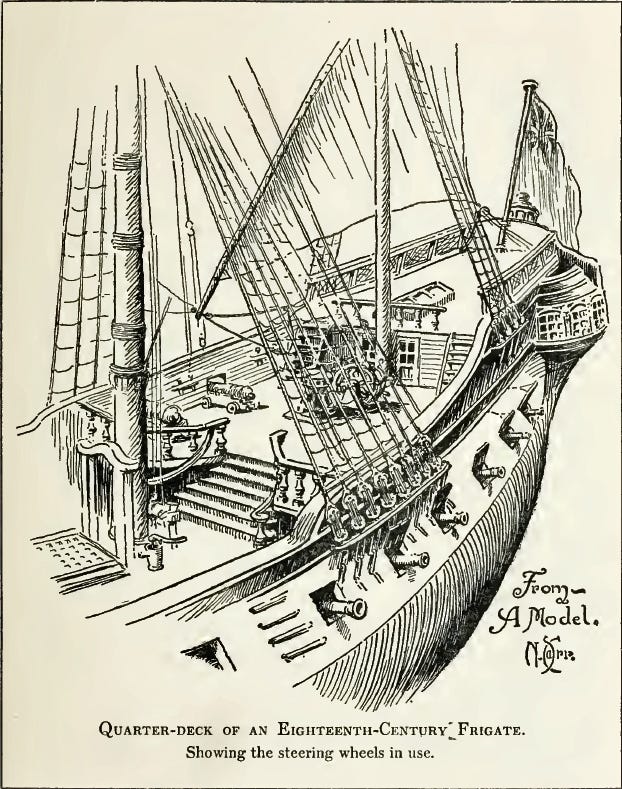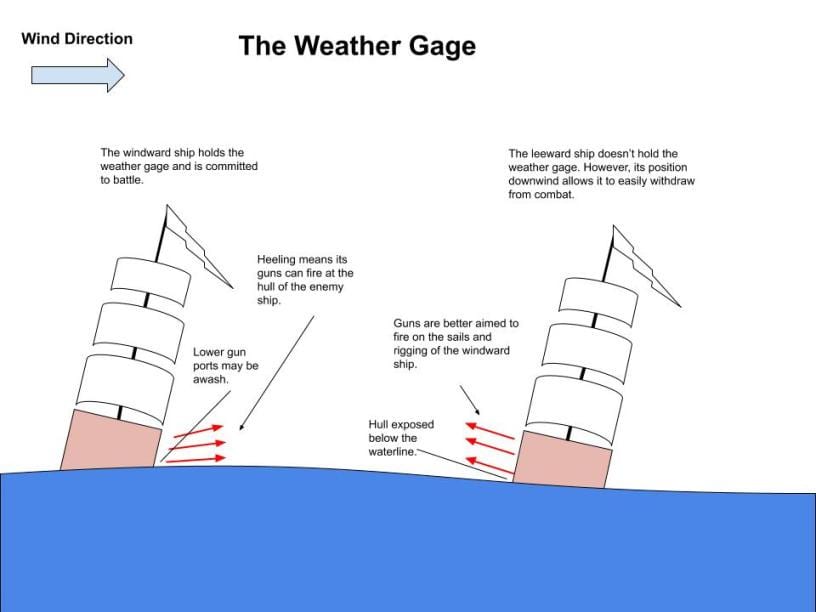解释风帆时代英国海军的统治地位 (Explaining British Naval Dominance During the Age of Sail)
LESSWRONG LW Login Explaining British Naval Dominance During the Age of Sail 5 min read • Aristocracy and Hostage Capital EconomicsHistoryIncentivesMechanism DesignWarWorld ModelingCurated
164
Explaining British Naval Dominance During the Age of Sail
by Arjun Panickssery 28th Mar 2025 Linkpost from arjunpanickssery.substack.com 5 min read 10
164
前几天我讨论了高监控成本如何解释“贵族”治理体系的出现:
Aristocracy and Hostage Capital Arjun Panickssery · Jan 8 一种传统的说法是,20世纪以前的贵族是“旧腐败”,由于裙带关系,民事和军事职位分配效率低下,直到该系统被开明思想家胜出后由专业的公务员制度取代……
Douglas Allen论点中我没有展开的一个要素是英国海军。 他有一篇单独的论文,名为“The British Navy Rules”,更详细地介绍了为什么他认为制度激励机制使他们在1670年至1827年期间(即在大部分风帆作战时代)取得成功。
在七年战争(1756-1763)中,英国人在单舰作战中的伤亡比为7比1。 在法国大革命和拿破仑战争(1793-1815)期间,英国人在俘获/摧毁的舰船方面的差异为5比1,对于战列舰(最大和最强大的舰船)而言,差异为30比1。 到19世纪,当时的记载预计英国船只会击败拥有50%以上火力和船员的对手。
Allen引用证据表明,这种优势并非由于卓越的技术,而且到七年战争结束时,法国船只甚至略胜一筹。 火炮或其他设备没有任何实质性差异,并且任何新技术都会迅速被所有海军采用。
与之前的帖子类似,我们看到了一个动态,其中:
- 监控困难: 海洋很大,有时没有地图; 通信速度慢且有限。
- 存在很大的随机因素: 风暴和暴风雨常常是不实现特定目标的合理借口。
- 激励机制错位: 船长主要从捕获富有的商船并获得一部分战利品中获利。 在战斗中,船长在升高的后甲板上的位置使他容易受到攻击(Nelson在特拉法加战役中在 HMS Victory 的后甲板上被一名法国狙击手杀死)。
最后一点最为重要:这个时期的所有海军都存在船长和海军上将逃避战斗的问题。Trafalgar海战中,法国舰队有三分之一根本没有参战。船只经常可以将无法与敌人交战归咎于风或机会。考虑Trafalgar海战的前奏:
其中一个更著名的事件是Nelson对法国和西班牙联合舰队的追击。 这支联合舰队于1805年3月设法逃脱了法国地中海港口土伦的封锁。Nelson以为他们要去埃及,便向东去了。 在意识到自己的错误后,他横渡了大西洋,搜寻了加勒比海,然后又回到了欧洲。 直到10月,他才在Trafalgar与Admiral Villeneuve的联合舰队交战,几乎追了8个月。 在这种情况下,海军部无法对船长进行直接监控。
英国海军在多个层面上都旨在鼓励船长作战:
补偿: 除了巨额奖金(捕获一艘商船可以使一名船长终身富裕)之外,还存在一种工资制度,其中军官供过于求,未出海的海军军官的工资减半。 由此产生的失业人员更容易通过将其调回船长名单来约束军官。(Allen认为,固定工资制会导致逆向选择,因为领取半薪的船长不是海军的永久雇员,但会拒绝没有报酬的委托。)
晋升: 与可以通过购买获得任命的陆军不同,对于任何达到船长军衔的人,都保证通过资历获得晋升。 如果一位船长没有蒙受耻辱地活得足够长,他最终将成为舰队的海军上将。 分配到一艘船上的中尉可能永远不会晋升为船长,但也不能被其船长解雇。Allen声称这种关系很重要,因为中尉被要求保留船舶活动的详细日志,这些日志可以与船舶主人的日志进行交叉引用(级别最高的士官,也不能被船长解雇)。 这些日志将起到“看门狗”的作用,以监视船长的表现。
战斗战术: 在这里,Allen提出了两点。 首先是“战列线”阵型,在这种阵型中,舰船实际上排成一列以与对手匹配。 尽管这种阵型具有奇怪的特性,即只有在敌人也形成战列线时才能轻松进行战斗,但它具有使海军上将(通常位于该线的中心)可以轻松监视其他船长行为的优势。 第二条规则是“夺取优势”,即保持在敌人的上风处。 从技术上讲,这是劣势,因为较低的炮口通常可能在水下(请参见图片),并且由于下风(下风)位置可以使在需要时更容易逃离。 但是夺取优势的优势在于,那个时期的方帆船的船长通常只能驶向敌人。
尤其是其他海军没有采用夺取优势的策略,而法国军事理论家则故意采取相反的策略,即保持在向下位置并射击到敌舰的桅杆和索具中。 但正如上面的Trafalgar示例所示,这使船长更容易逃避责任。
战争条例规定与任何大小与自己相当的敌舰交战。 这被认真对待,并且经常要求判处死刑(重点是我的):
10. 舰队中的每一位旗队长,船长和指挥官,如果接到战斗的信号或命令,或者发现任何他有责任交战的舰船,或者在可能发生交战的情况下,没有为战斗做好必要的准备,并且没有亲自按照他的职位鼓励下级军官和士兵勇敢地战斗,应处以死刑或根据罪行的性质和程度,军事法庭认为他应受到的其他惩罚;如果舰队中的任何人以叛逆或懦弱的方式投降或要求宽恕,则每个如此犯罪的人,并经军事法庭判决有罪,应处以死刑。
...
12. 舰队中的每个人,由于怯懦,疏忽或叛逆,在行动时撤退或退缩,或不参加战斗或交战,或不尽其所能地夺取或摧毁每一艘他有责任交战的船只,并协助和救济所有以及他有责任协助和救济的陛下舰船或其盟友舰船,每个如此犯罪的人,并经军事法庭判决有罪,应处以死刑。
这些法律最著名的应用是在七年战争开始时,Admiral Byng从地中海的巴利阿里群岛返回英格兰,而不是在法国船只损坏了他的舰队的帆后寻求当地的修理。(请注意,Allen对事件的描述与Byng的 Wikipedia page 相矛盾,后者声称Byng出发前往直布罗陀,然后被来自英格兰的一艘来船替换,尽管相关部分说“需要引用”)。 Byng因未能“尽其所能”而被军事法庭审判并判处死刑,并在国王拒绝了第一海军大臣和首相的赦免请求后被枪杀。
19世纪蒸汽船的引入结束了大多数这些做法,包括严厉的战争条例,这些条例被1860年代的《海军纪律法》所取代。 在同一十年中,涉及中尉的不连续晋升系统被逐步淘汰。 我们再次看到监控能力与制度设计相关。
New to LessWrong?
Getting Started FAQ Library Economics2History2Incentives2Mechanism Design2War2World Modeling1Curated
164
Explaining British Naval Dominance During the Age of Sail
32Neil
7Arjun Panickssery
11David Hornbein
8Ruby
8Alexander Gietelink Oldenziel
7Joseph Miller
5Arjun Panickssery
2jasoncrawford
1Nick Moise
1kilgoar
New Comment
Submit
10 comments, sorted by
top scoring
Click to highlight new comments since: Today at 4:19 PM
[-]Neil 2mo3222
I like object-level posts that also aren't about AI. They're a minority on LW now, so they feel like high signals in a sea of noise. (That doesn't mean they're necessarily more signally, just that the rarity makes it seem that way to me.)
Reply1
[-]Arjun Panickssery1mo70
More object-level content: Why Have Sentence Lengths Decreased? — LessWrong
Reply
1
[-]David Hornbein15h110
A good summary, but it's worth noting that while the death penalty for failing to fight was on the books, Byng's execution was the only time it was ever actually carried out. It's a bit similar to how the US military legally has the authority to execute deserters, but in the past century has only ever exercised this once out of tens of thousand of sentences (Eddie Slovak during WWII).
From reading the autobiography of Lord Cochrane, an insanely aggressive and insanely successful captain during the Napoleonic Wars, my impression is that the Royal Navy was very concerned with the allocation of credit, glory, and prestige, as well as money prizes. He describes a system where officers are writing to the Admiralty headquarters to describe the meritorious or shameful actions of their peers and subordinates after every major action, and sometimes convoked courts martial to resolve disputes, as in the case of Lord Cochrane's rival Lord Gambier. Lord Cochrane also argues that the prize system is critical to maintaining the Royal Navy's morale and effectiveness.
Reply
[-]Ruby1d84
Curated. I don't think we're past the point where exposition of how incentives and information flows shape things is valuables. The default lens we/society thinks in terms of is raw power (bigger/stronger/whatever) being the reason for supremacy, and it just feels very instructive to say that just as decisive in how things go is information and motivation. Relatedly, you get things like some places flourishing and some floundering because of different regulatory environments, Goodhart's. In general, kudos to Arjun for writing that exposes how maybe the actual reason for things isn't what you'd immediately assume, e.g. perhaps it's just population size.
Reply
[-]Alexander Gietelink Oldenziel1mo82
I did not realize the death penalty for captains failing to engage was the proper context for Horatio Nelson's immortal signal " England expects that every man will do his duty"
Reply
[-]Joseph Miller2mo72
The unemployment pool that resulted from this efficiency wage made it easier to discipline officers by moving them back to the captains list. I don't understand this point or how it explains captains' willingness to fight. Reply [-]Arjun Panickssery2mo50 That part encourages captains to avoid shirking in general (rather than to use aggressive tactics in particular) because it increases the costs of job loss (due to high compensation) and because there are captains in reserve that can replace them quickly. Reply [-]jasoncrawford21h20 In the Hornblower series of novels, at one point Captain Hornblower surrenders to the enemy during a naval battle. He is captured by the French, but later escapes. When he gets home, he's put on trial for surrendering. They finally acquit him when it is revealed that he had lost something like half (maybe two-thirds?) of his crew—basically massive casualties. But surrendering was considered guilty until proven innocent. Reply [-]Nick Moise2h10 I think the main reason is less captain's incentives but rather superior discipline and training for the crew. The Royal Navy was extremely "modern" in this regard, with highly trained crews, and a kind of industrial level of ship maintenance and supply. This gives you healthy, trained men on your ship, which you can then use to pursue your incentives. But the discipline and order comes first. Reply [-]kilgoar17h*10 What you are describing as the "aristocratic system," I think better called the Feudal arrangements, continued later into the industrial period most famously in the American South, where large estates were becoming increasingly economically viable with the combination of slave labor and mechanized processing of cotton. Some old world cultural expressions of medieval chivalry not only had persisted there but were becoming more popular, with a craze for dueling, a deadly menace mentioned repeatedly in the press. In spite of the aristocratic cultural vigor and highly militarized aristocracy, the Confederacy never had much of a chance against the industrial, logistical and numerical advantage of the Union, and indeed, the superior communication lines available by telegraph. During the period discussed in your post the British were not significantly culturally different from other European competitors for me to put great faith in the argument that this gave them more success at sea, at least against other Europeans. Throughout the age of sail the British generally maintained a significantly larger and more effective fleet than the French or indeed any of their competitors and so always benefited from making more aggressive action. When you have all the chips at the table that's just how the game goes. Additionally, the British held a few key technological advantages in the velocity of their artillery projectiles and in the chronometer, an extremely sophisticated device which was designed to keep navigationally accurate track of time while in the heaviest seas and through earth's varying gravity. Arguably the chronometer was the greatest advantage the British ever obtained, considering knowledge of one's longitude is important to exercising sea power. Indeed, this is the era in which communication and navigation has already become quite reliable.On the one hand it's true that relevant information and communication gives powerful force-multiplying advantages. On the other hand, it's not true that a warrior culture with some equivalent to the Articles of War is in itself advantaged in any way from more desultory strategies. Reply Moderation Log More from Arjun Panickssery 52What Does It Mean to "Write Like You Talk"? Arjun Panickssery 1d 6 234To Understand History, Keep Former Population Distributions In Mind Arjun Panickssery 23d 13 267Why Have Sentence Lengths Decreased? Arjun Panickssery 1mo 89 View more Curated and popular this week 164Explaining British Naval Dominance During the Age of Sail Arjun Panickssery 1d 10 176Learned pain as a leading cause of chronic pain SoerenMind 5d 35 190PSA: The LessWrong Feedback Service JustisMills 4d 12 10Comments PreviousNext

